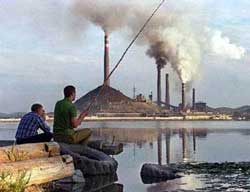Russia forced to ratify Kyoto Protocol to become WTO member
Russia needs to ratify the document to make it work, as Russia is the world's second largest source of greenhouse gases
The Federation Council of Russia is to decide upon the ratification of the Kyoto Protocol on Wednesday. Most likely, Russian senators will ratify the document. The situation, however, is still ambiguous. The protocol has more adversaries than proponents. In addition, the latter can not boast of having brilliant arguments. 
The United Nations framework convention on climate change, the Kyoto Protocol, stipulates the reduction of emission of carbonic and other gases, which create the greenhouse effect on the planet. Russia needs to join the document so it could come into effect. As long as the Russian industry experienced a decline in the 1990s, atmospheric emissions dropped considerably. That is why Russia obtained an opportunity to sell its gas emission quotas to the countries, which had such emissions increased since 1990. In theory, they have a right to cut their gas emission obligations, if they invest in Russian projects.
One hundred and twenty countries signed the Kyoto Protocol, although only 32 states ratified it. Russia needs to ratify the document to make it work, as Russia is the world's second largest source of greenhouse gases: the country has 17 percent of the world's share at this point. US President George W. Bush announced that America would not ratify the protocol, which was not a surprise, for the USA makes 36.1percent of all emissions.
Russian President Putin entrusted the Russian Academy of Sciences and the Ministry for Industry and Energy with preparing a report about consequences that the implementation of the Kyoto Protocol might have for the Russian economy. Scientists from the Academy of Sciences analyzed the situation and concluded that the Kyoto Protocol did not have the scientific substantiation. Academicians offered to continue studying the influence of climate on economy. In particular, they advised to look into the matter of possible consequences that the global warming will have for Russia. Russian academicians believe that it would have several rather positive effects for the “coldest country in the world.” On the other hand, the global warming might flood a half of Europe.
Academician Yury Israel believes that the implementation of the Kyoto Protocol will help cut the emission by only 0.3 percent, as the countries that ratified the document make up only one-third of the total share of CO2 emissions. China, India, Saudi Arabia abstained from the ratification, although their emissions are rather considerable.
The president's economic advisor, Andrey Illarionov, who is considered to be the main critic of the Kyoto Protocol in Russia, believes that the document will become the bone of contention of the development of the Russian economy. The majority of developed countries are currently going through the post-industrial period, when the GDP power capacity and the CO2 emissions are decreasing. The Russian industry is far from being on its peak now: hopefully, the country will catch up with the level of the Soviet industry. Therefore, Russia's atmospheric emissions will grow and overcome the level of 1990, which is the basic year for Kyoto members.
It would be impossible to ignore the experts' opinion, but the Russian administration strives for Russia's membership in the World Trade Organization. It will be quite a challenge for the Russian economy, if it can handle the integration in the global market. President Putin gave away two islands in Russia's Far East to China to obtain its support for Russia's WTO membership. The European Union demanded Russia should ratify the Kyoto Protocol, if it wanted to become a WTO member. The statement about that was exposed in Brussels as an ultimatum in May of this year.
Several Russian politicians started haggling with the EU. They asked to write off the Russian state debt to the IMF and the Paris Club, having categorized it as the spending for the reduction of greenhouses gasses, which Russia achieved in 1990-2000. If the worst comes to the worst, they also offered to restrict the import of dirty technologies and utilization goods to Russia.
The Russian government chose a different way to go. The ratification of the Kyoto Protocol will have positive consequences too. Russia might sell its excessive emission quotas. If they do not let the Russian government do it, one may think of foreign investments that the country will have on account of power capacity and emission reduction projects. Investments in the field of public utilities, power engineering and timber industry will total some $2.5 billion.
Meanwhile, the State Duma gave the first reading to the draft law about the ratification of the Kyoto Protocol. It only took it a couple of hours to do it, as if the longstanding discussion did not exist.
The Federation Council will have to say its word on the matter on Wednesday. A spokesman for the Federation Council, Vladimir Goncharenko, said that the protocol would most likely be ratified due to its political importance. However, the government's analysis of the issue is far from being sufficient, said he.
There is no common opinion in Russia as far as the Kyoto Protocol is concerned. Why does Russia need to limit its industrial growth, even in theory? A lot of people think that the protocol serves as a pretext for new speculations. However, it will be ratified due to its political importance.
Subscribe to Pravda.Ru Telegram channel, Facebook, RSS!





